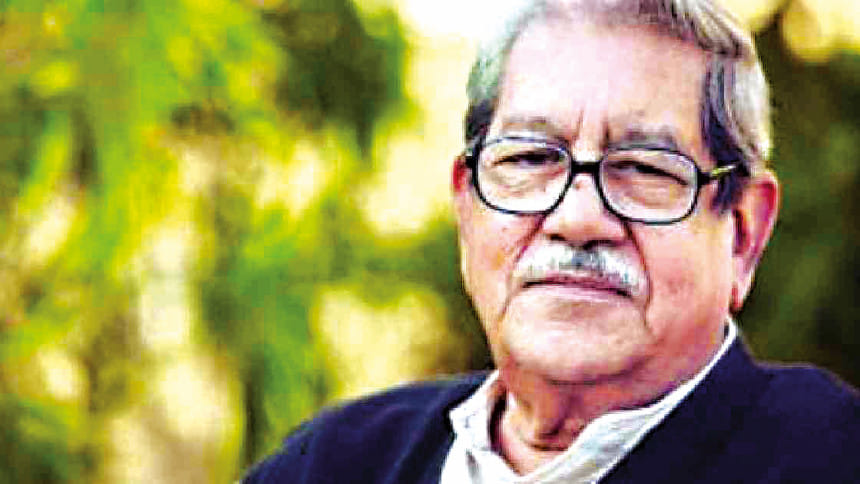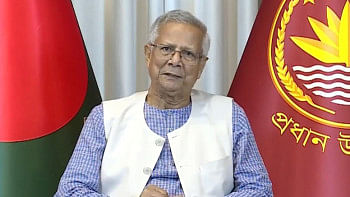Our Anis Sir: A Tribute

In the space of just a few months, Bangladesh has become a land of vanishing greatness. First came the news of the passing of Sir FH Abed, then in early April we lost architect Bashirul Haq, a few days later Professor Jamilur Reza Choudhury, and finally Professor Anisuzzaman who died on May 14 from multi organ failure, aggravated by COVID 19 infection. I have had the privilege to know all of them closely, and came to admire their professional integrity, sincerity and dedication to duty.
It is hard enough to bear the loss of a colleague or mentor one has known for a long time and enjoyed the company of, but it is harder when the loss happens at a time when paying one's last respects is made impossible by a lockdown. When Professor Anisuzzaman was laid to rest in Azimpur graveyard, instead of hundreds of grievers, only his close family members and a couple of well-wishers were present. The eerie silence was broken by the desolate notes from bugles played by a police team giving him a guard of honour. If the scourge of the pandemic hadn't touched us, his remains would've been carried to the Shahid Minar where a huge assembly of mourners would've converged, but then we wouldn't have lost him so early. Professor Anisuzzaman had been in and out of hospital several times in the last few years, but he never lost his cheers. Ever the optimist, he even joked that a few days in the hospital was good for his health, as it kept him away from his regular chores, some of which -- like presiding over long and rambling discussion meetings—were downright tedious. Even when I had a brief talk with him over phone when he had come back from Labaid hospital in the second week of April, he dismissed any serious threat to his health. "Just the usual complications," he said cheerily, "nothing to worry about."
My association with Professor Anisuzzaman – or Anis Sir – began immediately after he joined Dhaka University in the mid-1980s. His office was only a few steps down the hall from mine, and one day as he made his way to the teachers' lounge downstairs, he invited me to join him. In our academia, senior professors usually maintain an "appropriate" distance from their junior colleagues. Having recently returned from Canada with a Ph.D. and with memories fresh of bonhomie and cheerful addas with most professors there, it was difficult to adjust to the uncomfortable status-divide. Anis Sir was clearly an exception. From day one, he placed me in my comfort zone, and I found it immensely rewarding to interact with him, share his insights about many issues that engaged him and take part in wide ranging conversations enlivened by his wit and wisdom. Not many could match his good humour and generosity and his intelligent and disarming use of gentle irony. I was once invited as a discussant to a seminar on Ludwig Wittgenstein, whose Tractatus had given me many a sleepless night during my Ph.D. course work. The main speaker had written a dense and jargon filled paper, which he read in a monotone, often leaving his audience puzzled about what he was driving at. Anis Sir was the chair, and when his time came to deliver his address, which he usually did in five to six minutes, with clarity and completeness, he smiled indulgently at the speaker, who had realized by that time that he had failed to connect with the audience. "Didn't Wittgenstein say that the meaning of a word is its use?" Anis Sir said, "It's not what you say, but how you say it, and the context in which you say it, that produces meaning. So have no worries. There was no shortage of meaning today." I was surprised that Anis Sir had read the other mind-blowing book of the philosopher, Philosophical Investigations. When I asked him, he said with a shy smile, "Part of the job, you know."
Job indeed! I've seen him excel in every "job" he had been entrusted with – teaching, which was his lifelong passion, researching, compiling, editing, even proofreading, chairing, being at the vanguard of protest movements, campaigning for the rights of religious and ethnic minorities and women, and defending freedom of conscience. He was committed to liberal educational ethics and lamented the impoverishment of our public universities; he regretted that humanistic values were on the wane and tolerance was receding. He was never openly critical of anyone though, not even those who opposed his coming back to his alma mater, which was Dhaka University, but I have seen him to be a little impatient with ideologues without issues and academics currying favours with political leaders.
Professor Anisuzzaman was an outstanding thinker and a public intellectual who maintained a critical engagement with issues that impacted our lives, ranging from loss of political freedom and the rise of communalism to commercialization of education. He joined Jubo League, at the time a cultural rather than a political outfit, in 1951 when he was only fourteen and actively participated in the language movement of 1952. In an interview with me which I took for Deepto TV on the occasion of his 80th birthday, he told me how the language movement had taught him the value of culture in establishing a social order where everyone could participate on an equitable basis. It was this realization that later inspired him to study and write on cultural pluralism, which he saw as a way out of the essentialism and reductive logic of monoculturalism. He was a pioneer in this field in the country, having articulated his thoughts in public platforms long before multicultualism was accepted as an academic discipline.
Professor Anisuzzaman came to prominence in the 1960s, a decade marked by an ascendancy of left-liberal values and literary and cultural nationalism that aimed at a re-ordering of our world. The period saw our commitment to liberation and social justice. Culture, including popular culture, became central in our counter-attack against repression and denial of rights. As the Pakistani colonial state apparatus, backed by a ruthless military-corporate alliance, began a systematic marginalization and disenfranchisement of the Bengalees, the identity struggle that ensued led to a renewed sense of nationalism. Professor Anisuzzaman, along with other intellectuals, not only helped shape its cultural contours but also its spheres of activism. One of his significant contributions has been a redefinition of the Muslim mind away from the monolithic, pan-Islamic one promoted by the Pakistani state. His seminal work, Muslim Manosh O Bangla Shahitya (1964)-- his Ph.D. dissertation-- showed the evolution of the Muslim mind (or consciousness) from the beginning of British colonial rule as reflected in the literature of the time, and examined the marginalization of Muslim writers in academic and scholarly discussions. Apart from the general bias against Muslim authors that existed among Hindu literary historians, one reason why they were ignored, he believed, was their separation from the syncretic tradition that the literature of the middle ages advanced, which was largely the result of the rise of Islamic purificatory movements in the 18th century -- although Muslim and Hindu writers had equal participation in the literature of the middle ages. Another reason was the confusion that existed among many Muslim writers about which Bangla to use since, as Muslims, they needed to use a language that reflected their beliefs, customs and cultural practices. This prompted them to liberally borrow from Persian and Arabic languages, creating, what the historian WW Hunter called a "Musalman Bengali." The confusion about language remained for quite a while, as Professor Anisuzzaman has shown in a separate study on the journals of Muslim Bengal, because of a persistent identity crisis. It was the 1952 language movement that finally resolved the crisis by asserting a changed self-image of the Bengalees as a secular, multi-ethnic and multi-cultural community with the possibility of unlimited self-realization. It was indeed the moment Bengalees as a nation stepped into the modern world.
An outstanding memoirist, Professor Anisuzzaman has described in detail the developments that changed the cultural and political landscapes of Bangladesh from the 1950s. The three volumes of his memoirs, Amar Ekattor (1997), Kaal Nirobodhi (2000) and Bipula Prithibhi (2015), which loosely form a trilogy, record, in his own words, "the significant events" that he witnessed and his "encounters with some very important persons." With an authorial honesty that is not usually seen in self-writing of this kind, he has given more importance to objective documentation than to matters relating to subjective expression. In this he was helped by a prodigious memory and an exemplary power of observation. Ekattor begins with the mass movement of 1969 and narrates the events of 1971; Pritibhi begins where Ekattor ends, but concludes with the end of the millennium, while Nirobodhi deals mostly with his family history but takes the reader right to the war of liberation. These are books one has to read to discover the real Anisuzzaman, our Anis Sir, whose life long pursuit has been the re-education and regeneration of the Bengalee mind. History will judge to what extent he has succeeded, but when asked the same question in a conversation on his last birthday, he smiled and shook his head, then added, as an afterthought, 'Well, I tried.'
With Anis Sir, humility was endless.
SMI edited the festschrift Anisuzzaman Shommanona Grnatha (Chandrabati, 2017) on Professor Anisuzzaman's 80th birthday.

 For all latest news, follow The Daily Star's Google News channel.
For all latest news, follow The Daily Star's Google News channel. 



Comments